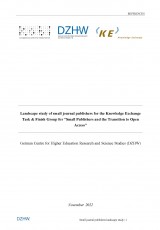
While the transition to open access (OA) as a major paradigm in scientific communication is fully under way, the different modes of getting there remain to be solved. If major players possess the resource and means to (have) convert(ed) to OA, smaller publishers are still challenged because their viability may be felt as being at stake. While larger publishers and policy making entities set the scene of transitioning to OA, the smaller actors have to cope with these trends to survive, using new models for their content production and dissemination if they can. The question is 'can all small publishers do this and what can be done to enable them to do so?'
So-called small publishers, i.e. those who originate from academic initiatives outside the mainstream distribution channels, belong to a long-tail which is also meaningful for scholarly discourse and communities. In addition, they are part of the expression of academic freedom and the diversity of information sources academics are keen to preserve.
The capacities of long-tail publishing and their potential empowerment to use OA sustainable economic models is what this Knowledge Exchange (KE) activity is trying to explore. The aim is to:
- Identify the challenges and 'pain points' small publishers may face
- Define options to adapt
- Identify stakeholders which might contribute
- Establish the support that would secure viable transition to genuine OA
A prerequisite is to landscape the situation of small publishers by better understanding:
- What they are
- What they do
- What they are trying to overcome or struggle with
Part of the challenge is to define what 'small' means when talking about publishers. In June, KE commissioned consultant DZHW who undertook a quantitative study to draw up an inventory of characteristics for this specific group of small and independent publishers. This is a first step and a further more qualitative approach will need to gain a better insight into the challenges to OA sustainability for this essential sector. KE strives to preserve bibliodiversity and pinpoint matching solution and action pathways for these publishers and their supporting ecosystem.
DZHW (Deutsche Zentrum für Hochschul-und Wissenschaftsforschung) is the German Centre for Higher Education and Science Studies. Based in Hanover and Berlin, it carries out application-oriented empirical research.
A full list of all participants of the Task & Finish group who are contributing to this activity is available at the end of this page.




















